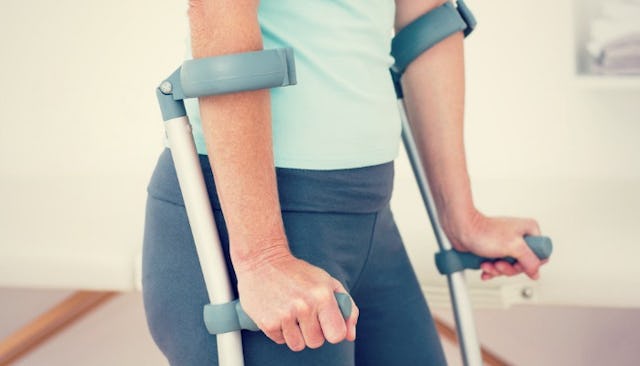But She Was Worth It, Right?

Having my daughter changed me—right down to my bones.
I was still in an opioid-induced haze the first time someone asked me, “But your daughter was worth it, right?” At that moment, unable to move from my hospital bed, I was not at all sure.
At the end of the second trimester of my pregnancy, I was out for a short jog when a sharp pain in my groin doubled me over in agony. My doctor wasn’t worried, though. “Pelvis and hip discomfort is just a normal part of pregnancy,” she said in her snarky way. “Suck it up” is what she meant.
As my pain increased, I went from using crutches to a walker and finally to a wheelchair. Yes, I was excited to meet my daughter, but mostly I wanted her to get the heck out of my body. I couldn’t stand on my feet to shower, and my husband had to help lower me to the toilet. My extreme pain made me want to crawl out of my skin, and I dreamed of popping a few Advil to numb my body.
Following labor, it took a series of pelvic X-rays and an MRI to confirm that the sharp twinge I’d felt while jogging had not been a running injury; it had been a warning. I’d experienced the first sign of transient osteoporosis, a rare, pregnancy-induced condition in which large amounts of calcium are leeched from bones. The tests showed that the ball part of my hip had suffered a series of stress fractures, warping the bone’s shape. It also revealed three other fractures in my hips and pelvis, likely from labor.
At 29, my body was permanently damaged.
When I became pregnant, I’d been prepared to relinquish many luxuries: a full night’s sleep, date nights with my husband, those slim-fitting jeans. I would even happily take a step back from running while my daughter shared my body. “You’ll be back out there in no time,” my running friends assured me.
But at a follow-up visit weeks later, my doctor said, with a smile, “The only time you’ll ever run again is if you’re being chased down a dark alley.”
Surely, he meant it as a joke, but it stayed with me as I stumbled out of his office on crutches. Once in my apartment, the doctor’s words repeated in my head as I stared at the many running bibs from marathons, half marathons, and road races that plastered my bedroom wall.
It took four months of rehab and physical therapy before I could walk without crutches, carry my daughter around the apartment, or push her in a stroller. I looked on with envy as my husband effortlessly swooped her up in his arms, took her on walks, and rocked her when she cried. What kind of mom couldn’t care for her own daughter?
“What about just 3 miles, once in a while, years from now?” I pled with the orthopedic surgeon.
“Running will lead to significant arthritis. You’ll end up needing a hip replacement sooner rather than later.”
When I told a former running buddy, she looked at me sympathetically. “She’s worth it, though, right?”
In those first few postpartum weeks, I didn’t know how to respond to this question. I choked on my words, mumbling, “Of course!” but there were times I didn’t mean it. I felt trapped in this unfamiliar new “Mom” identity, and I longed for the familiar. I adored my beautiful daughter, but I wanted my undamaged body back, and I didn’t want to trade one for the other.
I tried hard to suppress it, but I couldn’t help feeling just the tiniest bit of resentment. At night, I would kiss my daughter’s soft cheeks and put her to sleep in a bassinet next to my bed. I’d lie on my side, on my fractured hip, and choke back tears as I gently rocked her to sleep, every sway inflicting pain, reminders of the parts of me now broken.
I chided myself whenever those feelings surfaced. I had a happy, healthy baby. Why couldn’t my love for her overshadow all the rest? I felt deeply guilty for wishing things had gone differently.
Weeks passed, and when my daughter was 7-weeks-old, I had healed enough to walk short distances on crutches. Determined to get out of my apartment, I signed up for a local new moms’ class. With these peers, I could finally speak without prefacing every statement with, “I love my child, but….” Each week, amid coos and giggles from the babies, we supported each other as we acknowledged our sacrifices in a space where judgment was checked at the door.
Slowly, my bones grew stronger. I’ve made some new friends, some through the mothers’ group, who don’t ask me whether or not my daughter was worth a broken body. They know the answer: yes, a thousand times yes—but please don’t dismiss my scars.
People say that nothing truly prepares you for parenthood. Having my daughter broke parts of my body and soul, but I’ve picked up the pieces and have started putting myself back together again.
Often, I think about how I will someday tell my daughter the story of her birth. Will she ask me why I don’t run anymore? How will I spare her feelings of guilt over hurting Mommy’s bones?
If she decides to have children of her own, I hope her body will not fail her. But even if she has the easiest of pregnancies and births, I’ll want her to know that having children changes you in ways that you can’t anticipate. There will be losses along the way, but on the other side there will be a new, stronger version of herself—a less naïve version, prepared to make the sacrifices inherent in parenting and one who recognizes that (once the dust settles), those sacrifices will be so, so worth it.
This article was originally published on